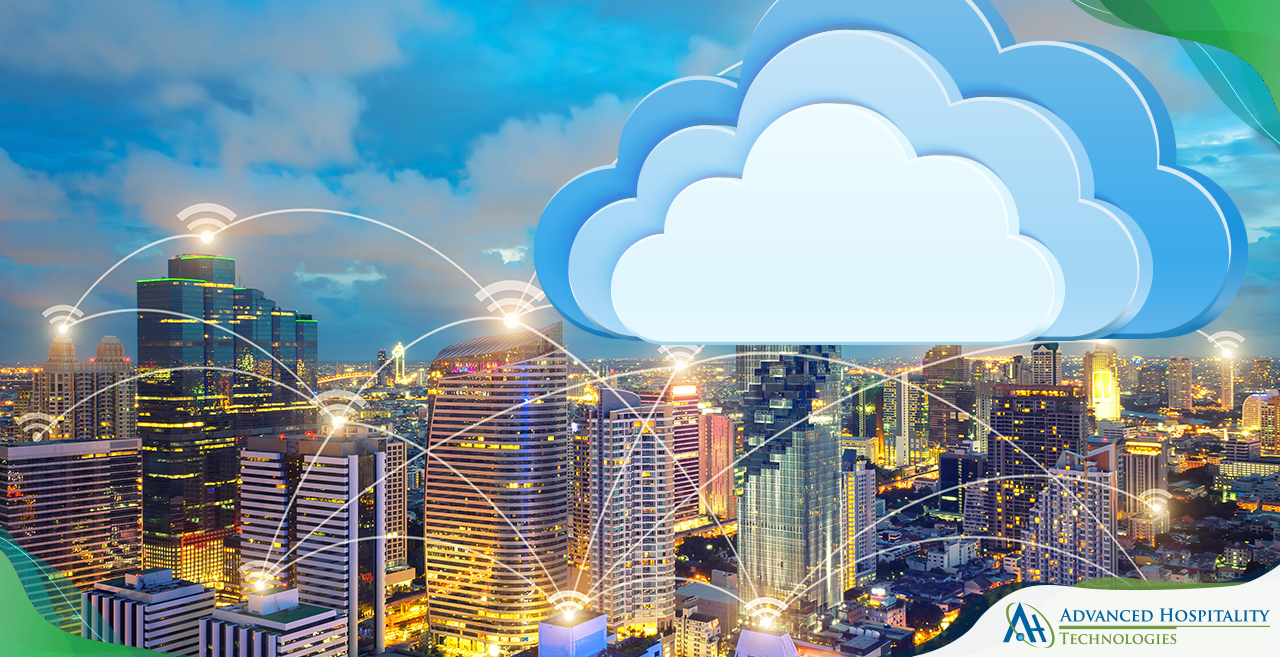Introduction
Cloud technology refers to the delivery of computing services such as servers, storage, databases, networking, software, analytics, and intelligence over the Internet. Similarly, Cloud Technology for Hospitality encompasses the myriad ways that cloud-based solutions can benefit hotels, resorts, casinos, restaurants, and other hospitality businesses.
Cloud computing enables hospitality companies to access applications and data from anywhere at any time. Instead of having to maintain costly on-premises IT infrastructure, companies can leverage the resources of cloud providers to deploy solutions rapidly and only pay for what they use. Cloud technology brings scalability, flexibility, and potential cost savings.
There are three main types of cloud technology:
Infrastructure as a Service (IaaS)
This is the most basic category of cloud computing. With IaaS, users can access IT infrastructure like servers, storage and hardware through a cloud provider.
Platform as a Service (PaaS)
PaaS provides users with a cloud environment for developing, testing and managing software applications without having to build the infrastructure. The service includes OS, programming language execution environment, database and web server.
Software as a Service (SaaS)
SaaS is software that users can access via cloud hosting rather than installing the software on individual devices. Common examples are email, calendars and office suites like Google Workspace or Microsoft 365.
The benefits of cloud computing include:
- Cost savings since there’s no need to invest in physical infrastructure.
- Flexibility to scale services up or down as needed.
- Access applications from anywhere with an internet connection.
- Regular updates and maintenance handled by the cloud provider.
- Improved collaboration when multiple users can access the same files and tools.
- Enhanced security and disaster recovery through cloud provider’s services.
Cloud Computing in Hospitality
The hospitality industry is rapidly adopting cloud technology to improve operations and better serve guests. Cloud computing provides the ability to access software, platforms, and infrastructure over the internet, rather than having to maintain these systems on-premises. This allows hospitality businesses to be more agile, reduce costs, and enable new capabilities.
Guest-facing systems are transitioning to the cloud. In-room entertainment platforms like GuestTek are fully cloud-based, delivering on-demand movies, games, Internet access, and integrated casting from guests’ mobile devices. Tablet-based menus, like those from Presto, enable restaurants to seamlessly update their menus in the cloud. Mobile check-in, digital key, and chatbots are other guest services enabled by cloud platforms.
The cloud allows hospitality businesses to quickly scale while only paying for the computing resources they use. It also keeps them up-to-date with the latest software. The ability to access information anywhere makes staff more productive. Cloud technology will only continue revolutionizing the hospitality industry in the years to come.
Benefits of Cloud Technology for Hospitality
Cloud technology offers several key benefits for the hospitality industry:
Cost Savings
Cloud computing eliminates the need for costly on-site servers and IT infrastructure. Instead of maintaining your own hardware and data centers, you simply pay for the computing resources you use. This allows hospitality businesses to reduce their capital expenditure and benefit from predictable operating costs based on usage.
Scalability
With the cloud, hospitality companies can easily scale their computing resources up or down to meet changing demands. This flexibility is especially useful for handling peak seasonal loads and events. Additional capacity can be spun up as needed without having to purchase new hardware.
Flexibility
The on-demand nature of the cloud gives hospitality firms the agility to deploy new applications and services quickly. Rather than lengthy hardware procurement and installation processes, new resources can be deployed in minutes. This enables hospitality companies to respond faster to changing guest expectations and market conditions.
Mobility
Cloud computing enables secure access to systems and data from anywhere with an internet connection. This allows hotel staff to access guest information and property management systems remotely via mobile devices. Front desk agents can check-in guests from tablets, and managers can monitor operations when offsite. The cloud facilitates a mobile, distributed workforce.
Cloud-Based Property Management
Cloud technology has transformed property management in the hospitality industry. By moving critical systems to the cloud, hotels can streamline operations across departments.
For front desk operations, cloud-based property management systems (PMS) enable staff to quickly check guests in and out, assign rooms, manage rates, and access guest profiles anywhere. This allows front desk agents to assist guests from mobile devices instead of being tied to a desk.
Cloud-based PMS also facilitates online reservations, automates confirmation emails, and provides a guest portal for self check-in/check-out. This improves efficiency while delivering better service.
Housekeeping and maintenance also benefit from cloud-based property management. Staff can receive cleaning and maintenance requests instantly on mobile devices. Cloud systems track room status in real time, so housekeeping knows which rooms are clean, dirty or occupied.
Maintenance staff also gain mobility to respond to issues quickly while managers have visibility into work order status. Preventative maintenance is streamlined with cloud-based tracking of assets and schedules.
By moving property management to the cloud, hotels connect departments and information. This allows staff to provide consistent, high-quality service to guests across the property.
Cloud-Based Guest Services
Cloud technology has opened up many new possibilities for enhancing the guest experience in hospitality. Guest-facing apps, smart room controls, and virtual concierges are some of the innovative services enabled by the cloud.
With cloud-based guest apps, hotels can provide services like choosing rooms, ordering room service, booking spa appointments, requesting housekeeping, accessing entertainment options, controlling in-room devices, and checking out through a guest’s own mobile device. These apps allow for a seamless, personalized, and paperless experience throughout the stay.
Smart room technology takes advantage of mobile and cloud connectivity to give guests control over room features and mood settings. From lighting and temperature to window shades and entertainment, cloud-enabled devices allow everything to be adjusted with the tap of an app. Virtual assistants can also be integrated to serve as an in-room concierge available 24/7.
Virtual concierges powered by AI and natural language processing can assist guests with requests, recommendations, and information. Cloud connectivity allows these chatbot concierges to provide quick, customized service through guests’ mobile devices anywhere on the property. This provides a layer of responsive, personalized service without guests having to visit the front desk or call staff.
By leveraging cloud capabilities, hospitality providers can deliver next-level guest experiences and services that are convenient, personalized, and forward-thinking. Cloud-based innovations are quickly becoming guest expectations.
Data Security
Data security is a top concern when adopting cloud technology in the hospitality industry. With cloud computing, data is stored on remote servers rather than on-premises servers. This means hospitality companies must entrust third-party providers with sensitive customer information including names, addresses, credit card numbers, and more.
Protecting guest data is crucial, so hospitality companies should only work with cloud providers that have robust security measures in place. Reputable cloud providers will be compliant with data protection regulations like GDPR and offer encryption to prevent unauthorized access. They should also have protocols for access controls, network security, and disaster recovery.
To minimize risks, hospitality firms can take steps like limiting data collection to only essential information, anonymizing customer data where possible, and using two-factor authentication. Training staff on security best practices is also key. With proper precautions, hospitality companies can harness the benefits of the cloud while still safeguarding customer data.
Challenges of Implementing Cloud Technology in Hospitality
The hospitality industry faces some unique challenges when adopting cloud technology. While the benefits are numerous, there are hurdles that need to be addressed.
Connectivity Issues
Many hospitality businesses such as hotels, restaurants, and resorts are located in remote areas without strong internet connectivity. Implementing cloud-based solutions requires reliable high-speed internet access. Spotty connections can disrupt operations and frustrate guests. Hospitality businesses need to evaluate their infrastructure and invest in robust wired and wireless networks.
Training Staff
Transitioning to new cloud-based platforms requires training staff across the organization. Front desk agents, servers, housekeepers, and managers may need to learn entirely new software and procedures. This takes time and resources. Hospitality businesses need to allocate budgets for ongoing training and support.
Integrating Legacy Systems
In many cases, hospitality businesses have legacy on-premise systems already in place. Migrating data and integrating these with new cloud platforms can be challenging. There may be compatibility issues and gaps in functionality that need to be addressed. A phased, strategic approach is required when dealing with legacy systems.
Overcoming these challenges takes planning and investment. However, the long-term benefits of moving to the cloud make it worthwhile for most hospitality businesses. With proper connectivity, training, and integration support, the obstacles can be managed.
Future of Cloud in Hospitality
The future of cloud computing in the hospitality industry looks very promising as new innovations continue to emerge. Here are some of the key trends and growth areas to watch:
Artificial Intelligence and Machine Learning
AI and ML tools deployed via the cloud will transform how hotels interact with and serve guests. Chatbots, recommendation engines, predictive analytics, and other smart services will become widespread. Cloud platforms enable the rapid scaling of these technologies across hotel properties.
Internet of Things
More IoT devices like smart thermostats, AI-powered robots, and voice assistants will be deployed in hotels to automate and enhance the guest experience. The data from these devices can be analyzed in the cloud.
Big Data Analytics
The ability to gather guest data from various touchpoints and analyze it in the cloud will help hotels gain insights to personalize services, optimize operations, and improve loyalty. Cloud analytics make big data more accessible.
Mobile Experience
Mobile check-in, digital keys, chat features, and other mobile engagements will continue growing. Cloud platforms allow these mobile experiences to be quickly updated and delivered to guests.
Automation
More backend operations like finance, HR, and procurement will be automated and migrated to the cloud. This frees up hotel staff resources.
Enhanced Security
As data moves increasingly to the cloud, security features like encryption, access controls, and network monitoring will improve. Cloud providers invest heavily in security.
Hybrid Cloud
Rather than pure public or private cloud, hotels will use a mix of both to optimize costs, capabilities, and security based on their needs. More options for hybrid cloud deployments are emerging.
The cloud will soon be integral to nearly every aspect of hotel operations. As the technology evolves, the hospitality industry is poised to benefit tremendously from accelerated innovation and expanded capabilities via the cloud.
Conclusion
Cloud technology has the potential to transform the hospitality industry by streamlining operations, enhancing the guest experience, and providing data-driven insights. By adopting cloud-based solutions, hotels and resorts of all sizes can manage properties more efficiently, deliver innovative services, keep data secure, and reduce IT costs.
While migrating to the cloud comes with challenges like ensuring connectivity, training staff, and addressing security concerns, the long-term benefits make it a worthwhile investment. Cloud technology enables hospitality businesses to be agile, proactive, and responsive in a highly competitive market.
By embracing cloud technology, the hospitality industry can provide personalized and seamless guest experiences while optimizing operations. The future looks bright for hotels, resorts, and travel brands that leverage the flexibility, insights, and innovation enabled by the cloud. The time is now for hospitality businesses to take advantage of everything cloud platforms have to offer.




